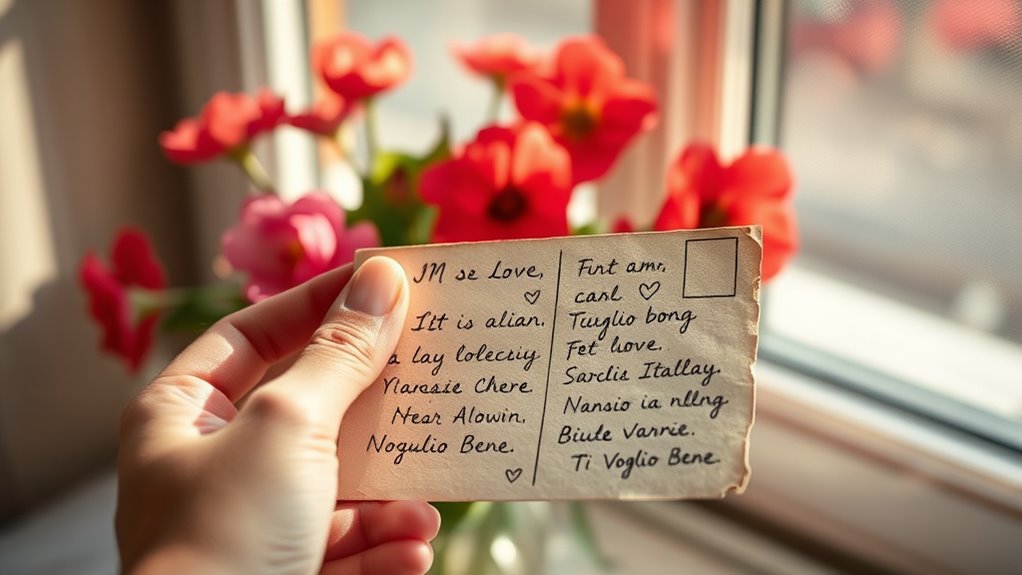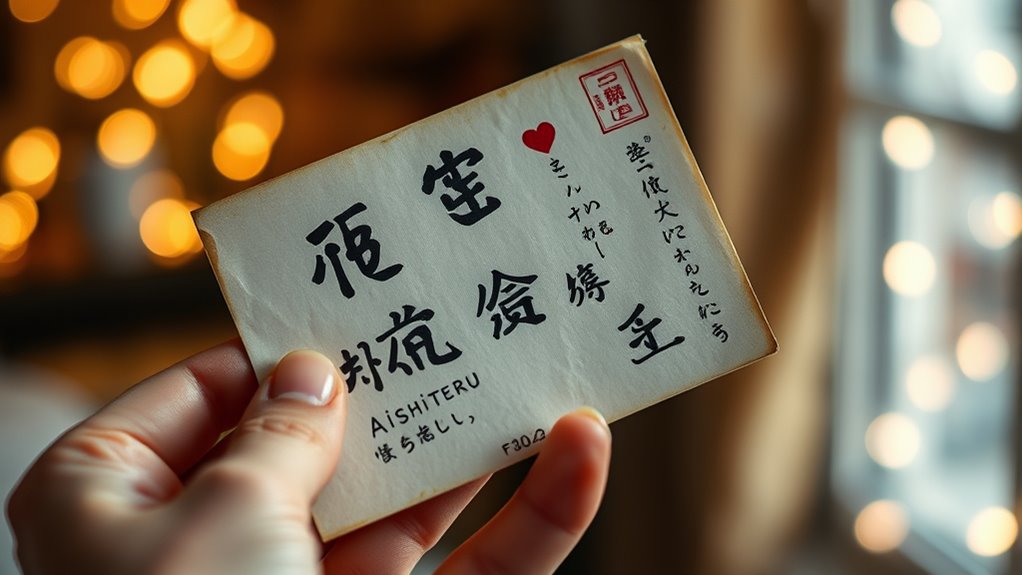Discovering how different cultures express love can deepen your understanding of human connection. You might be surprised by the variety of words and phrases used around the world, each carrying its own emotional weight. As you explore these heartfelt expressions, you’ll see how language reflects cultural values and personal bonds. Curious about how saying “I love you” varies across languages? There’s more to uncover that could change the way you communicate affection forever.
Key Takeaways
- Different languages have unique phrases for expressing love, such as “Ti amo” in Italian and “Je t’aime” in French.
- Cultural context determines when and how to appropriately say “I love you” or its equivalent.
- Pronunciation tips enhance sincerity and understanding across languages, emphasizing genuine emotional delivery.
- Distinguishing between casual and deep expressions (e.g., “Te quiero” vs. “Te amo”) is crucial for authentic communication.
- Recognizing cultural nuances ensures heartfelt expressions are respectful and properly received worldwide.
Saying “I Love You” in English

Saying “I love you” in English is straightforward and holds deep emotional significance. While the phrase seems simple, cultural nuances can influence how and when you express it. In English-speaking cultures, it’s often used to show affection in close relationships, but timing and context matter. To guarantee your sincerity is understood, pay attention to pronunciation tips: emphasize the “I” clearly, soften the “love,” and maintain a gentle tone. The phrase’s emotional weight relies on genuine delivery rather than perfect pronunciation. Remember, cultural nuances can affect how your words are received—some may prefer more subtle expressions of love. Mastering these pronunciation tips helps convey your feelings authentically, making your declaration resonate more deeply. Additionally, understanding the contrast ratio of your communication can enhance how your message is perceived, ensuring your words leave a lasting impact.
Expressing Love in Spanish: “Te Quiero” and “Te Amo

When expressing love in Spanish, you’ll notice that “Te Quiero” and “Te Amo” aren’t interchangeable. “Te Quiero” is more casual and often used among friends or family, while “Te Amo” is reserved for deep romantic feelings. Understanding when to use each phrase helps you communicate your emotions more accurately.
Differences Between “Te Quiero” and “Te Amo
In Spanish, the phrases “Te Quiero” and “Te Amo” both express love, but they carry different emotional weight and are used in distinct contexts. “Te Quiero” is more casual, often used among friends or family, reflecting cultural nuances and linguistic variations. “Te Amo,” on the other hand, is deeper and more intense, reserved for romantic partners or profound commitments. Understanding these differences helps you communicate affection appropriately. Here’s a quick comparison:
| Phrase | Usage Context | Emotional Intensity |
|---|---|---|
| Te Quiero | Family, friends, romantic partners | Light, affectionate |
| Te Amo | Romantic, lifelong love | Deep, passionate |
Knowing when to use each phrase ensures your feelings are conveyed authentically. Recognizing the linguistic variations between these expressions can enhance your cultural understanding and improve your communication skills.
Appropriate Contexts for Usage
Have you ever wondered when it’s appropriate to use “Te Quiero” or “Te Amo” in Spanish? Cultural differences influence their usage, so tone and timing matter. “Te Quiero” is suitable for friends, family, or romantic partners early in a relationship, conveying affection without intense emotion. In contrast, “Te Amo” is reserved for deep, serious love, often in long-term relationships or marriage. Using these expressions incorrectly can lead to misunderstandings or seem insincere. Pay attention to the context and the emotional depth of your feelings. Recognizing the cultural nuances helps you express love authentically and respectfully, ensuring your words resonate appropriately in different situations. Knowing when to say each phrase strengthens your connection and shows genuine understanding of the cultural subtleties. For example, understanding the horsepower of electric dirt bikes can be crucial when choosing a bike for adventure, just as knowing the right context for “Te Quiero” and “Te Amo” is key to meaningful communication.
Romantic Words in French: “Je T’aime

Expressing your love in French is both romantic and timeless, and the phrase “Je t’aime” captures that sentiment perfectly. When you say it, you tap into cultural nuances that emphasize sincerity and passion. To make your expression more authentic, focus on pronunciation tips: say “Je” as “zhuh,” “t’aime” as “tem,” with a soft nasal sound. French pronunciation can be tricky, so practice slowly to avoid miscommunication. Remember, “Je t’aime” isn’t just words; it’s a heartfelt declaration rooted in centuries of romantic tradition. Using this phrase thoughtfully shows deep affection and respect for French culture. Whether whispered or spoken loudly, “Je t’aime” will always carry a powerful, genuine emotion. Additionally, understanding the symbolism of love expressions in different cultures can deepen the emotional impact of your words.
Heartfelt Phrases in Italian: “Ti Amo” and “Ti Voglio Bene

When you want to express deep affection in Italian, “Ti Amo” is the phrase to use, often reserved for romantic love. Meanwhile, “Ti Voglio Bene” is more versatile, suitable for close friends and family. Understanding the different contexts helps you convey your feelings sincerely and appropriately. Additionally, knowing about WWE Raw’s financial impact highlights how entertainment industry phrases can be part of larger cultural expressions.
Expressing Deep Affection
In Italian, there are two heartfelt ways to convey deep affection: “Ti Amo” and “Ti Voglio Bene.” While both express love, they’re used in different contexts and carry distinct emotional weight. “Ti Amo” is reserved for romantic love, reflecting intense passion, whereas “Ti Voglio Bene” signifies caring and deep friendship. Understanding these nuances helps you navigate cultural differences and language nuances more effectively. Here’s a quick comparison:
| Phrase | Usage Context | Emotional Intensity |
|---|---|---|
| Ti Amo | Romantic love | Very deep, passionate |
| Ti Voglio Bene | Friendship, family | Warm, caring |
| Cultural differences | Vary by relationship | Varying emotional depth |
| Language nuances | Formal vs. informal | Subtle emotional cues |
| Appropriate timing | When expressing love | Context-dependent |
This clarity helps you express affection more authentically in Italian. Recognizing these cultural distinctions enhances genuine communication across relationships.
Different Contexts of “Ti Amo
Understanding the different contexts in which Italians use “Ti Amo” can help you communicate more genuinely. In Italy, “Ti Amo” typically expresses deep romantic love, reserved for significant others or life partners. Cultural nuances shape its use, making it more intense than casual expressions of affection. Be mindful of linguistic variations; Italians might opt for “Ti Voglio Bene” when expressing love to family or friends, which feels warmer but less romantic. Using “Ti Amo” too casually or prematurely could be misunderstood. Recognizing these subtle differences allows you to convey your feelings authentically, respecting Italian customs. Additionally, luxurious tiny house living emphasizes the importance of understanding cultural and emotional nuances to deepen genuine connections. By understanding these nuances, you show respect for the language’s emotional depth and avoid miscommunication in heartfelt moments.
Alternative Loving Phrases
Italian offers two heartfelt ways to express love: “Ti Amo” and “Ti Voglio Bene,” each suited to different relationships and emotional depths. Understanding these phrases highlights cultural differences and language nuances. “Ti Amo” is reserved for romantic love, conveying a deep, passionate connection, while “Ti Voglio Bene” is more versatile, expressing affection for friends or family. Recognizing when to use each phrase shows respect for Italian cultural norms. These distinctions help you navigate emotional expressions appropriately, avoiding misunderstandings. By choosing the right phrase, you honor the relationship’s nature and cultural context. This subtle linguistic difference emphasizes how language reflects emotional intimacy and societal values, enriching your appreciation for Italian expressions of love.
Conveying Affection in German: “Ich Liebe Dich

Expressing love in German is straightforward with the phrase “Ich liebe dich,” which translates to “I love you.” When you say these words, you’re sharing deep affection directly and sincerely. The cultural significance of saying “Ich liebe dich” varies across contexts; it’s typically reserved for serious relationships, so use it thoughtfully. To pronounce it correctly, focus on “Ich” sounding like “ish,” “liebe” as “lee-beh,” and “dich” as “dikh,” with a soft “ch” similar to the Scottish “loch.” Practicing pronunciation helps you sound genuine and respectful. Remember, Germans value sincerity, so saying “Ich liebe dich” with confidence and warmth makes your feelings clear and meaningful. It’s a simple yet powerful way to express love in German.
Loving Expressions in Japanese: “Aishiteru” and “Suki

In Japanese, expressing love can range from heartfelt to casual, depending on the situation. You might say “aishiteru” to show deep, serious affection, while “suki” is often used for lighter feelings or casual admiration. Understanding when and how to use these phrases helps you communicate love appropriately in different contexts. Recognizing the cultural nuances behind these expressions can deepen your appreciation for authenticity and self-identity in communication.
Expressing Deep Love
When it comes to conveying deep love in Japanese, two expressions stand out: “aishiteru” and “suki.” While “suki” is a more casual way to say you like someone, it can also express romantic affection in certain contexts. Understanding their cultural significance and language nuances helps you appreciate their depth.
- “Aishiteru” is reserved for serious, heartfelt love, often used in committed relationships.
- “Suki” can mean simply “like,” but when said with sincerity, it expresses a deeper romantic feeling.
- “Aishiteru” carries emotional weight and is rarely spoken casually or lightly.
- Both phrases reflect Japan’s nuanced approach to love, emphasizing sincerity over superficial expressions.
Casual Affection Phrases
While “aishiteru” is reserved for serious love, “suki” is more versatile and commonly used in casual situations to show affection. In Japanese culture, the subtle differences highlight cultural nuances around expressing feelings; “suki” can mean “like” or “love,” depending on the context. You’ll notice that using “suki” in everyday conversations signals warmth without the intensity of “aishiteru,” which is reserved for deep commitment. This distinction reflects cultural differences in emotional expression—where overt declarations are less common. Language nuances also influence how openly people share affection. By understanding these subtleties, you can navigate Japanese social cues more comfortably, knowing when to use “suki” casually and when “aishiteru” carries the weight of serious love. Recognizing the importance of emotional expression helps in appreciating the cultural significance behind these phrases.
Saying “I Love You” in Chinese: “Wǒ Ài Nǐ

Expressing love in Chinese is straightforward and meaningful with the phrase “Wǒ Ài Nǐ,” which translates directly to “I love you.” This simple yet powerful expression is commonly used in romantic contexts, but it can also convey deep affection among family and friends. When using this phrase, you should consider the cultural nuances that influence how love is expressed. For example, the language’s evolution reflects changing attitudes toward openness and emotional expression. Keep these points in mind:
Express love in Chinese with Wǒ Ài Nǐ, reflecting sincerity, cultural nuances, and evolving emotional expressions.
- “Wǒ Ài Nǐ” emphasizes sincerity and respect in relationships.
- It’s often used during special moments or heartfelt conversations.
- Cultural nuances may influence whether you say it openly or reservedly.
- The phrase embodies the direct and evolving ways Chinese speakers express love today.
Romantic Words in Hindi: “मैं तुमसे प्यार करता हूँ” (Main Tumse Pyaar Karta Hoon)

In Hindi, expressing love is both passionate and poetic, with the phrase “मैं तुमसे प्यार करता हूँ” (Main Tumse Pyaar Karta Hoon) serving as a heartfelt declaration. This phrase holds deep cultural significance, symbolizing affection and respect in Indian traditions. When pronouncing it, focus on clarity: “Main” (mah-een), “Tumse” (toom-say), “Pyaar” (pyar), and “Karta Hoon” (kar-tah hoon). Stressing the correct pronunciation shows sincerity and helps your partner feel truly cherished. The phrase’s emotional weight makes it a cherished way to express love in Hindi-speaking communities. By mastering its pronunciation, you honor the language’s romantic tradition and deepen your connection through meaningful words.
Affectionate Phrases in Arabic: “أحبك” (Uhibbuka / Uhibbuki)

Arabic offers beautifully simple ways to express love, such as the word “أحبك” (Uhibbuka for males or Uhibbuki for females). This phrase holds deep cultural significance, often conveyed with sincerity and emotion. When learning it, you might face pronunciation challenges, especially with the guttural sounds. To help you understand better:
Arabic’s love phrase “أحبك” (Uhibbuka/Uhibbuki) carries deep cultural emotion and significance.
- Say “Uhibbuka” if you’re addressing a male.
- Use “Uhibbuki” when speaking to a female.
- Remember the emphasis on the “U” sound at the beginning.
- Practice the pronunciation to avoid misunderstandings, as cultural nuances make the phrase more meaningful.
Mastering this phrase allows you to connect authentically with Arabic speakers and appreciate its emotional depth.
Expressing Love in Russian: “Я тебя люблю” (Ya Tebya Lyublyu)

If you want to tell someone “I love you” in Russian, you can say “Я тебя люблю” (Ya Tebya Lyublyu). This phrase holds deep cultural significance, often expressing sincere affection and emotional depth. Unlike some languages, Russian has linguistic nuances that emphasize intimacy and heartfelt sentiment. The phrase uses the accusative form “тебя” instead of “ты,” highlighting a personal connection. Russians may reserve this phrase for serious relationships, so using it thoughtfully shows genuine feeling. It’s not just a literal translation but a reflection of cultural values around love and closeness. By saying “Я тебя люблю,” you honor the rich language and its tradition of expressing profound emotion, making your declaration both meaningful and culturally respectful.
Frequently Asked Questions
How Do Pronunciation Differences Affect Expressing Love in Various Languages?
You might find pronunciation challenges when expressing love in different languages because dialect variations and sounds can be tricky. These differences can make it hard to say “I love you” perfectly, sometimes leading to misunderstandings or less confidence. But don’t worry—practice helps! By listening to native speakers and focusing on pronunciation, you’ll improve and feel more comfortable sharing your feelings across languages and cultures.
Are There Cultural Nuances in Saying “I Love You” Worldwide?
Imagine a garden where each flower’s bloom reflects a culture’s unique way of saying “I love you.” You’ll notice that cultural expressions and emotional nuances shape how love is conveyed worldwide. Some cultures speak softly, emphasizing subtle gestures, while others shout their feelings openly. These differences highlight that saying “I love you” goes beyond words—it’s rooted in cultural nuances, making each expression a reflection of deep-rooted traditions and emotional landscapes.
Can “I Love You” Have Different Meanings in Different Languages?
When you say “I love you,” you might not realize that cultural interpretations and linguistic variations influence its meaning. In some cultures, it’s a deep emotional commitment, while others see it as casual or affectionate. You should consider these differences because the phrase’s significance varies across languages and societies. Recognizing these nuances helps you communicate more authentically and respectfully, avoiding misunderstandings rooted in cultural and linguistic diversity.
What Are Alternative Romantic Phrases in Less Common Languages?
When exploring romantic idioms and affectionate expressions, you discover unique ways to say “I love you” in less common languages. Instead of the usual phrases, try expressions like the Tagalog “Iniibig Kita,” or Swahili “Nakupenda.” These phrases convey deep affection and add cultural richness to your romantic conversations. Using such idioms shows your genuine interest and appreciation for different languages and their heartfelt ways of expressing love.
How Do Non-Verbal Gestures Complement Verbal Expressions of Love Globally?
Imagine holding a loved one’s hand during a quiet moment; that simple gesture often speaks louder than words. Non-verbal gestures like a hug or a gentle touch are powerful cultural expressions of love worldwide. They complement verbal expressions by conveying deep emotions, transcending language barriers. These gestures act as universal symbols of affection, strengthening connection and trust, especially when words may fall short or be misunderstood across different cultures.
Conclusion
No matter the language, love is a universal melody that echoes in every heart. It’s like a beautiful tapestry woven with words from around the world, each phrase adding its own vibrant hue. When you say “I love you,” you’re sending a heartfelt message that crosses borders and cultures, uniting souls like stars shining together in the night sky. Embrace these words, and let love be your guiding light across every language.









